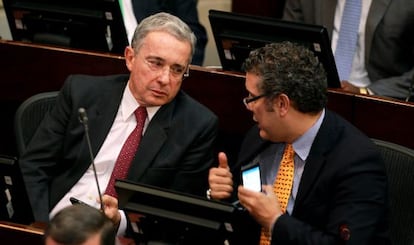Colombian senator charges Álvaro Uribe with ties to drug lords and death squads
Iván Cepeda, son of a murdered communist leader, wants ex-president’s past to be investigated

It was not the first time that Colombia’s elected representatives had argued over the nearly three decades of paramilitary activity in the country. But for more than nine hours on Wednesday, Congress focused exclusively on the alleged ties between Senator Álvaro Uribe (president between 2002 and 2010), the paramilitaries and the drug world.
The debate was initiated by a left-wing senator, Iván Cepeda, who is one of Uribe’s biggest critics.
Uribe is himself the most vocal opponent of President Juan Manuel Santos, and he continues to enjoy significant support among Colombians, especially those who defend a tough stance against the FARC guerrillas.
Uribe has long criticized Santos for the latter’s ongoing negotiations with the armed group in Havana. During his own presidency, he made the fight against armed groups, including FARC and the smaller guerrilla group, ELN, a national priority.
Uribe showed up in Congress at the beginning of the debate, but walked out before Iván Cepeda took the podium, arguing that he would present his evidence in the Supreme Court rather than in the legislative chamber.
Cepeda is the son of Manuel Cepeda Vargas, a communist politician who was killed by paramilitary forces in connivance with the state in 1994.
In a congressional address that was televised to the entire nation, his son attempted to prove the ties between Uribe, the drug rings and the paramilitary groups who decommissioned their weapons in 2005 and 2006. Paramilitary activity in Colombia has caused 250,000 deaths.
Using video footage, audio clips and documents, Cepeda listed what he views as evidence of Uribe’s longstanding relationship with the drug world since the 1980s, most notably with the notorious Pablo Escobar and his Medellín cartel. Later, according to Cepeda, paramilitaries supported Uribe in his 2002 run for the presidency.
Cepeda claims paramilitaries supported Uribe in his 2002 run for the presidency
The left-wing senator also reviewed Uribe’s time as mayor of Medellín, governor of Antioquia and senator prior to his presidential victory. Throughout, Uribe allegedly awarded favorable treatment to drug kingpins, members of the paramilitary and other criminals.
At the end of his address, Cepeda said that while there are currently seven accusations against Uribe by the Attorney’s office, a preliminary investigation underway in the Supreme Court and a statement by 24 paramilitaries against the former president, this last relationship has not been sufficiently explored.
Once Cepeda was done, Uribe returned to the chamber and defended himself, his family and his political career for over an hour. He called Cepeda “a consummate liar” and “an ally of the FARC.” He also called the entire debate “a moral lynching.”
The following hours were devoted to an impassioned debate between supporters and detractors of Uribe, who by that point had left the room once more.
Tu suscripción se está usando en otro dispositivo
¿Quieres añadir otro usuario a tu suscripción?
Si continúas leyendo en este dispositivo, no se podrá leer en el otro.
FlechaTu suscripción se está usando en otro dispositivo y solo puedes acceder a EL PAÍS desde un dispositivo a la vez.
Si quieres compartir tu cuenta, cambia tu suscripción a la modalidad Premium, así podrás añadir otro usuario. Cada uno accederá con su propia cuenta de email, lo que os permitirá personalizar vuestra experiencia en EL PAÍS.
¿Tienes una suscripción de empresa? Accede aquí para contratar más cuentas.
En el caso de no saber quién está usando tu cuenta, te recomendamos cambiar tu contraseña aquí.
Si decides continuar compartiendo tu cuenta, este mensaje se mostrará en tu dispositivo y en el de la otra persona que está usando tu cuenta de forma indefinida, afectando a tu experiencia de lectura. Puedes consultar aquí los términos y condiciones de la suscripción digital.








































